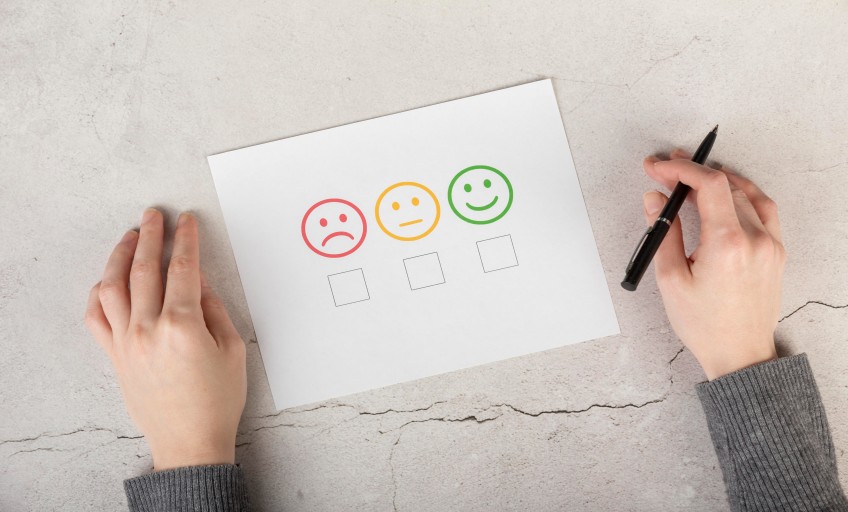![]()
Have you ever felt like your emotions are everywhere? What if you could track your moods and unlock powerful insights into your mental well-being?
What is mood tracking?

Mood tracking involves regularly recording and observing one’s emotional state to identify patterns, triggers, and potential mental health and well-being issues.
The concept of mood tracking: A simple guide
Mood tracking is a tool for understanding your emotional state, identifying patterns, and potentially recognizing triggers that affect your mood.
Why is mood tracking important for mental health
Mood tracking can be helpful for several different reasons. For example, it might help you:
- Identify external and internal triggers that cause mood changes or swings.
- Learn how sleep, diet, and daily activities impact your moods.
- Develop coping techniques to manage negative moods and unwanted behaviors. Recognize patterns to better understand shifts in mood.
- Determine what helps improve your mood.
The benefits of keeping a daily mood tracker
Mood tracking can help you in many ways. Some of the benefits are as follows:
- Detect stress early: By continuously monitoring physiological indicators, smartwatches can detect signs of stress before it escalates, which can help manage stress levels. For example, you will receive timely notifications when unusual situations, like abrupt mood changes, occur. Some smartwatches and apps will encourage proactive steps to manage stress levels, such as breathing exercises and mindfulness meditation.
- Identify triggers: Mood tracking can help you identify external and internal triggers that cause mood changes or mood swings. For example, you may notice your mood drops when you are stressed at work or skip a meal.
Knowing your triggers allows you to avoid them or prepare for them in advance. A smartwatch with mood tracking can help you monitor your condition in real time, identify warning signs of potential incidents, and seek help through an SOS call when needed.
How to track your mood
To track your mood effectively, use a journal, app, or chart to log your emotions daily, noting triggers, coping strategies, and related factors like sleep, diet, and exercise, and review your entries regularly to identify patterns and insights.
Using a daily mood tracker: Tips and best practises
Here are some best practises for tracking your mood daily:
- Set a schedule and stick to it. Choose a time each day to track your mood.
- Track beyond mood. Note situations or events that might affect your mood.
- Be honest and detailed. Record both positive and negative emotions.
- Choose a method to track your mood, such as journaling or using a mood-tracking app.
- Regularly look back at your mood records to identify patterns and trends. Notice how certain situations, events, or activities consistently lead to specific moods based on which you can learn how to manage your mood.
How to monitor your mood with a mood tracking app
To effectively monitor your mood with a mood tracking app:
- Choose a suitable app according to your needs
- Set up your app
- Log your mood regularly
- Analyze your data
- Use the app to improve your well-being
Steps to create a personalized mood tracker system
Here’s a step-by-step guide to help you get started:
- Define your goals and purpose
- Choose the format
- Select the mood categories
- Choose your tracking frequency
- Set up the system
- Add contextual information
- Analyze and reflect on trends
- Adjust and iterate
- Consider adding reminders
- Use data to improve your well-being
Impact on mental well-being
Mood tracking can significantly benefit mental well-being by fostering self-awareness, helping identify patterns in emotions and triggers, and enabling proactive self-regulation and managing emotional states.
How mood tracking can help identify emotional patterns
Mood tracking helps identify emotional patterns by consistently recording your moods and related circumstances, revealing recurring themes, triggers, and potential connections between events and emotional states, ultimately fostering self-awareness and emotional intelligence.
The positive impact of regular mood tracking on mental health
Regular mood tracking can significantly improve mental health by promoting self-awareness, helping identify patterns and triggers, and fostering better emotional regulation, ultimately leading to greater well-being.
The role of mood tracking in managing stress and anxiety
Mood tracking can be a valuable tool for managing stress and anxiety by helping individuals identify patterns, triggers, and potential interventions, leading to improved self-awareness and proactive coping strategies.
Introducing the Activ Health app
Take control of your mental and emotional well-being with the Activ Health app, which can accompany you on your journey for better mood management.
How the Activ Health app helps you track your mood
The Activ Health app helps track your mood by offering a feature that allows you to log your emotional state daily. Users can select from a range of moods or describe their emotions, enabling them to monitor their mental health over time. This helps build awareness of patterns or triggers that influence mood, such as physical activity, sleep, or specific events.
Features of the Activ Health app: Daily mood tracker integration
The Activ Health app offers a Daily Mood Tracker Integration that allows users to track and monitor their emotional well-being over time. This feature is designed to help users understand how their mood fluctuates and how factors like physical activity, sleep, and other health metrics may influence it.
Why choose Activ Health app for your mood tracking journey
Choosing the Activ Health app for your mood-tracking journey offers several compelling advantages, making it a great tool for improving overall well-being.
Why is a mood tracking app essential?

Mood tracking apps are essential for mental health as they help users gain self-awareness, identify patterns and triggers, and make informed decisions for better emotional well-being, potentially leading to improved mental health outcomes.
The advantages of using a mood-tracking app for daily monitoring
Using a mood-tracking app for daily tracking can help you identify patterns in your emotions, pinpoint potential triggers, and better understand your emotional well-being, potentially leading to proactive self-care and improved mental health.
How a mood-tracking app can help you understand emotional triggers
Mood-tracking apps help you understand emotional triggers by logging your moods, activities, and thoughts, enabling you to identify patterns and situations that consistently lead to specific emotional responses.
Top reasons to use a mood tracking app regularly
Regularly using a mood-tracking app can help you gain valuable insights into your emotional patterns, identify triggers, and develop coping strategies, ultimately improving your overall mental well-being.
A step-by-step guide
To effectively use a mood tracking app, start by understanding its features. Regularly log your moods and any relevant factors, and finally, review your data to identify patterns and potential triggers, which can help you better manage your mental well-being.
Setting up your daily mood tracker in the app
Here’s a step-by-step guide to help you set up your daily mood tracker:
- Choose a mood-tracking app
- Create an account if required
- Set up mood tracking preferences
- Set mood categories and rating scale
- Add customization for your tracker
- Set up goals
- Start tracking your mood
- Reflect and analyze your mood data
- Review and adjust your settings as needed
Logging daily mood updates with the Activ Health app
Logging daily mood updates with the Activ Health app can be a great way to track your mental and emotional well-being over time. Here’s how you can make the most of it:
- Set up notifications: If the app has reminders or daily notifications, enable them. This will help you remember to log your mood daily, ensuring consistency.
- Use mood tracking features: Many health apps, including Activ Health, offer mood tracking features that let you rate your mood or describe your feelings. Look for mood scales, where you can select options like happy, sad, stressed, etc., or a slider that measures emotional intensity.
- Add context: Some apps allow you to add notes along with your mood updates. This can be helpful to reflect on why you felt a certain way (e.g., “Felt great after a workout” or “Stressed because of work”).
- Review trends: Many apps show trends over time. It’s helpful to periodically look at your mood data to notice patterns and triggers in your emotions.
- Set goals: If you aim to improve your mood or emotional resilience, setting mood-related goals can keep you motivated and focused on your mental health.
- Track associated factors: Some apps allow you to track other health metrics (like sleep, exercise, or diet) alongside your mood. This can give you a clearer picture of how lifestyle factors affect your emotions.
Reviewing and analyzing your mood patterns using the app
Reviewing and analyzing your mood patterns using the Activ Health app is a great way to gain insights into your emotional well-being and identify factors influencing your mood. Here’s how you can effectively analyze your mood patterns:
- Review your mood history
- Identify patterns over time
- Look for triggering events
- Set long-term goals
- Use the insights to build healthy habits
- Consult with a professional
- Celebrate improvements
Mood tracking in daily life
Mood tracking in daily life can have a significant impact on your well-being by increasing self-awareness, improving emotional regulation, and helping you build healthier habits. Here’s how it can make a positive difference:
Incorporating a daily mood tracker into your routine
Incorporating a daily mood tracker into your routine can be a simple but effective way to enhance your mental well-being.
Tracking your mood to improve your productivity and happiness
Tracking your mood can be a powerful tool to boost your productivity and overall happiness. By understanding your emotional patterns, you can make smarter choices about how to structure your day, optimize your habits, and improve your well-being.
The long-term benefits of consistent mood tracking
Consistent mood tracking offers many long-term benefits that significantly improve your mental health, productivity, and overall well-being. By regularly tracking your emotions, you gain deeper insights into your emotional patterns, enabling you to make informed choices and build healthier habits.
Frequently asked questions
What is a mood tracking app?
A mood tracking app is a digital tool designed to help you monitor, record, and analyze your emotional well-being over time. These apps typically allow users to log their mood daily, often with additional details such as triggers, emotions, activities, or notes. The goal is to gain insights into your mood patterns, identify emotional trends, and better understand factors affecting your mental health.
How does a mood-tracking app help with mental health?
A mood-tracking app can be an incredibly valuable tool for improving mental health by providing insights into emotional patterns, helping individuals recognize early signs of distress, and promoting healthier habits.
Can a daily mood tracker really impact my mood over time?
Yes, a daily mood tracker can impact your mood over time in several positive ways! While the act of tracking your mood alone won’t necessarily change how you feel instantly, it can lead to significant improvements in emotional well-being through increased self-awareness, proactive behavior, and the ability to identify patterns and triggers.
Key Takeaways
- Mood tracking can help you identify internal and external triggers.
- Maintaining consistent mood tracking provides numerous long-term benefits that greatly enhance your mental health, productivity, and overall well-being.
- Log your daily moods with the Activ Health app.
Stay tuned to the Activ Living Community. Keep up to date with the latest health tips and trends through expert videos, podcasts, articles, and much more on nutrition, fitness, mindfulness, and lifestyle conditions like Asthma, Blood Pressure, Cholesterol, and Diabetes. Activ Living ke saath sahi sehat ki shuruat ABHI karo.
You may also be interested in the following blogs:
- Boost Your Mood Naturally: How Eating Citrus Fruits Can Help Lower Depression
- Anxiety And Mood Swings: Exploring The Connection And Strategies For Coping
Popular Searches
How to lower blood pressure | Fruits good for liver | Unhealthy foods | Ragi Benefits | Basal Metabolic Rate | Acupressure points for High Blood Pressure | Ayurvedic medicine for blood pressure | How to control cholesterol at home | Homeopathy for Asthma | Biological Age | Home remedies for TB | Natural beta blockers | Negative effects of internet | Types of walking | Blood pressure calculator | Blood sugar calculator | BMI Calculator





 1800-270-7000
1800-270-7000









